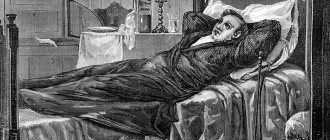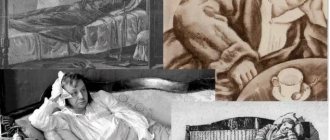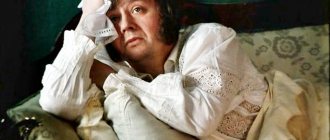Nanny I.A. Goncharova - V.I. Melnik
Ivan Aleksandrovich Goncharov was often called a “refined” novelist who had little knowledge of people’s life. He, in fact, did not delve too deeply into the life of the people. He once admitted: “I don’t know the life and morals of the peasants... I didn’t own the peasants, I didn’t have any village or land... I saw the common people, that is, peasants, farmers... passing by: either from a railway carriage, or from the deck ship." But where then does the deep comprehension of the national character in Oblomov come from? Indeed, in his Ilya Oblomov, the main, fundamental motifs of the Russian fairy tale, the epic about the hero Ilya Muromets, etc. shine with reflected light. Goncharov himself resolves this paradox: “I spent a lot of paint on the image of courtyard people, servants... servants, courtyard people... - too.” people "... I... brought up among servants... lived at first at home in the province among numerous servants...".
Unfortunately, a scientific biography of Goncharov has not yet been written, and Goncharov’s childhood is a particularly unclear period. But it is in childhood that artists, as a rule, organically assimilate the “golden reserve” of folk art. “I lived in the village for two years,” the novelist writes in “Servants of the Old Century.” We are talking about the village of Repyevka on the banks of the Volga, where Goncharov studied at the private boarding school of priest F.S. Troitsky. From Goncharov's autobiographies we know that at the boarding school Goncharov studied French and German and read a lot. In his autobiographies, the writer does not emphasize his acquaintance with folklore, but nevertheless notes in one of them that he found “in the servant’s room at home tales about Eruslan Lazarevich, Bova Korolevich and others, and read them too.” By the way, the fairy tale about Eruslan Lazarevich will be echoed in the novel “Oblomov”: “He sometimes likes to imagine himself as some kind of invincible commander, before whom not only Napoleon, but also Eruslan Lazarevich means nothing...”.
However, it is obvious that the lackey was not the main source of knowledge of folklore for Goncharov. Apparently, his nanny played the main role here. The novelist mentioned her in his memoirs “At Homeland,” as well as in letters to his family. Her name was Annushka. Fortunately, a photograph of her from 1862 has survived. Throughout his life, Goncharov retained his heartfelt love for his nanny. This deep grateful feeling for Anna Mikhailovna is noted by memoirists. Thus, the writer’s nephew M.V. Kirmalov writes: “Ivan Alexandrovich dearly loved his nanny Annushka. I remember well this old woman, who nursed me and who at that time lived in retirement with my grandmother Alexandra Alexandrovna in Khukhorev. In her weak, withered body lived the crystal clear soul of a child, filled to the brim with love for children and for everyone at home...” Before us is a completely classic image from the time of Arina Rodionovna of a kind of “literary nanny”: for some reason she turned out to be too dear to the writer, who remembered her until the end of his life. And this “something”, I think, is correctly indicated in the memoirs of G.N. Potanin: “fairy tales”! Unlike Pushkin, the author of “Oblomov” did not devote separate literary works to his nanny, but the image of the nanny, for example, in “Oblomov’s Dream” deserves attention. The author's personal impressions are clearly felt here. The nanny gives little Ilyusha a fabulous, mythological explanation of the world, with which she herself is satisfied. At the same time, she develops the child’s imagination and poetic worldview: “Why is it, nanny, that it is dark here, and there it is light, and then it will be light there too?” - asked the child. “Because, father, the sun goes towards the month and does not see it, it frowns; and as soon as he sees it from afar, he will brighten up. There is no doubt that Goncharov learned these pearls of popular imagination and poetry from his nanny, Annushka. In the novel, he seems to remember how “on an endless winter evening, timidly huddles close to the nanny, and she whispers to him about some unknown side, where there are neither nights nor cold.” In “Oblomov’s Dream,” a repertoire is indicated that is apparently close to the repertoire of Goncharov’s real nanny: “She tells him... about the prowess of Ilya Muromets, Dobrynya Nikitich, Alyosha Popovich, about Polkan the hero, about the passer-by Kolechische.” Here is a fairy tale about the Firebird, Emel the Fool, and the Bear on a wooden leg. We also see Anna Mikhailovna’s manner of telling wonderful folk tales: “Tale after story flowed. The nanny told the story with fervor, picturesquely, with enthusiasm, and in places with inspiration, because she herself half believed the stories. The old woman's eyes sparkled with fire: her head trembled with excitement; the voice rose to unusual notes.” Goncharov also describes his perception of these stories: “The child, overwhelmed by unknown horror, clung to her with tears in his eyes... the child could not stand it: with trepidation and a squeal, he threw himself into the nanny’s arms; Tears of fear flow from his eyes, and at the same time he laughs with joy that he is not in the claws of the beast, but on a couch, next to the nanny.”
The image of the nanny in “Oblomov’s Dream” is absolutely true to reality. Researchers did not pay attention to this main source of Goncharov’s folklorism, but in vain. The reality of this image, that the nanny Annushka forever occupied her significant and important place in the life of an adult writer, is evidenced not by fiction, but by a documentary essay: “The Frigate “Pallada””. In the essay “Russians in Japan in 1854,” Goncharov, as in “Oblomov’s Dream,” suddenly remembered his nanny: “I couldn’t believe that all this was happening in reality. At other moments it seemed to me that I was a child, that the nanny told me a wonderful fairy tale about unheard of people, and I fell asleep in her arms and was seeing all this in a dream.”
In Oblomov, Goncharov obviously listed only a small part of Annushka’s performing repertoire. Undoubtedly, she had a countless number of not only fairy tales, but also songs, sayings, and epics. It should be remembered that Simbirsk province in the 19th century. was one of the most “folklore”. It is known that the “Collection of Folk Songs of P.V. Kireevsky” consists in a significant part of the material collected in the Simbirsk province by the poet N.M. Yazykov and his relatives. Simbirsk itself, whose population in the middle of the 19th century was only twenty-four thousand people, was a provincial city, but it had not yet lost connections with the rural area. Suffice it to say that the Yazykov family collected most of the songs in their own home, from serfs and serfs. Such was the folklore atmosphere in an ordinary noble house in Simbirsk. It was the same, obviously, in the merchant house of the Goncharovs, located not far from the Yazykovs’ house, where the main role for the future writer was, of course, played by his nanny.
It is curious that in the “Collection of Folk Songs of P.V. Kireevsky” there are epic stories that were part of the repertoire of Ilya Oblomov’s nanny. Bylinas, obviously, were very widespread in the Volga oral tradition, which Goncharov noted in his novel. Another interesting thing is that the collection of P.V. Kireevsky was published in ten editions from 1860 to 1874, i.e. much later than the publication of Oblomov’s Dream. In this regard, the question arises about the sources from which Goncharov was known back in the 1840s. epic stories about Ilya Muromets and other heroes. It can almost certainly be said that this source is indicated in “Oblomov’s Dream” by the writer himself: this is his nanny, Anna Mikhailovna. By the way, the collection of P.V. Kireevsky included Volga region epics about those heroes whom Ilyusha Oblomov recognized from his nanny’s stories: these are epics about Ilya Muromets, Dobrynya Nikitich, Alyosha Popovich... The genre of epics turned out to be very close to Goncharov. Especially dear to the writer, judging by the novel “Oblomov,” is the epic about Ilya Muromets. No wonder he named his hero Ilya. Only in the depiction of the author of “Oblomov”, Ilya Ilyich is a hero who sat on the stove all his life, and never managed to accomplish any feats.
The publications of folklore material, which began in the mid-19th century and, it seems, were well known to Goncharov, are unlikely, however, to have given him more than the impressions of his earliest childhood. The main acquaintance with folklore was there, in Simbirsk, in communication with the nanny Anna Mikhailovna. Goncharov himself described the process of developing a person’s native language, in particular, its “folklore” layers, pointing to the huge role of childhood impressions: “It is not learned from notebooks and books, in the living room of dad and mom - and the first teacher is a wet nurse with her ahu, ahu…. and other interjections, then the nanny with her jokes and fairy tales... and then the processed, bookish, pure or literary language - in exemplary writers. Therefore, the language, and with it Russian life, is sucked in with mother’s milk - they study and play in childhood in Russian, mature, mature and are useful in Russian.” Goncharov’s “processed, pure, bookish”, very literary language began with “agu”, “agu”, with the jokes and fairy tales of Anna Mikhailovna. This language is not replete, of course, with proverbs and sayings, figures of speech, but it is not alien to them either. The novelist knows a lot of them: “If it weren’t for, and no but, we would have been rich long ago,” “You fool, you fool, you unreasonable woman, you would have said the same thing, but you wouldn’t have said it like that,” “It’s not the right time.” a guest is worse than a Tatar”, “It’s not for nothing that people say that a child under seven years old is an angel, from seven to ten is a youth”, “Whoever has not been to the sea has not prayed to God”, “There is no master for sin”, “God loves work "etc. Proverbs and sayings are found both in novels and in Goncharov’s letters.
However, in Goncharov’s texts there are even more common figures of speech: “We live - we chew bread”, “Limp on both legs”, “Failure would take you!”, “Neither God has a candle nor a damn poker”, “Not in the eyebrow, but right in the eye”, etc. Where could Goncharov hear all this?
For the novelist, the central place in Russian folklore is undoubtedly occupied by the fairy tale, and mainly the fairy tale. Goncharov himself, judging by “Oblomov’s Dream,” in his childhood heard many fairy tales from his nanny Anna Mikhailovna. However, the writer mentioned only a few of them here: the tale “about Emelya the Fool” (“Emelya the Fool”, “At the Pike’s Command”), the tale about the Firebird (“The Tale of Ivan Tsarevich, the Firebird and the Gray Wolf "), the fairy tale "about a bear with a wooden leg" ("Bear"). Goncharov quotes the last fairy tale about the bear in detail, citing from it the words of the bear who went in search of his leg: “Creak, creak, linden leg; I walked through the villages, walked through the village, all the women were sleeping, one woman was not sleeping, sitting on my skin, cooking my meat, spinning my wool.” We will not find such words in Afanasyev’s collection of fairy tales. This means that Goncharov did not use it, but most likely simply remembered the fairy tales of his childhood well, citing some Volga region version of the text of the fairy tale about the bear on a linden leg. Obviously, in this and in a number of other cases, we should talk about some kind of Volga version of the fairy tale, told by the same Anna Mikhailovna.
But, of course, the nanny’s main influence extended to the writer’s morality, to the deepest layers of worldview lying in the soul. This influence cannot be measured or assessed. But who knows how Goncharov’s writing career would have developed if “Simbirsk Arina Rodionovna” and his nanny, Anna Mikhailovna, had not been in his life? It is not for nothing that he writes that the nanny “with the simplicity and good nature of Homer, with the same lively fidelity to the details and the relief of the pictures, put into the children’s memory and imagination the Iliad of Russian life...” But “the lively fidelity to the details and the relief of the pictures” are the main distinguishing properties of artistic talent Goncharova. Would he have had all this without his nanny? In the memoirs of the writer G.N. Potanin, a characteristic episode is given that dates back to Goncharov’s stay in Simbirsk in 1849: “His conversations with the blind nanny were touching. It seems to me that sometimes he couldn’t find the words to call her more tenderly. “My beloved dove! Do you remember what fairy tales you cooed to me?..” And he will kiss the dove and stroke her head. “Do you want me to shower you with gold for them?” The old woman will be offended and whisper reproachfully: “Eh, Vanya, Vanya is unreasonable! What use should I take your money to the grave? Your love is dearer to me than anything in the world!” - and bursts into tears until hysterics.”
It’s a pity that we can say almost nothing about this unknown Russian woman from Simbia, who put her soul into her “Vanya” and so fully, albeit anonymously, participated in the creation of “Oblomov” and other Goncharov masterpieces. She was just one of many who supported the great spiritual connection of many Russian families and generations. In his novel, Goncharov writes: “Both old Oblomov and grandfather listened to the same fairy tales in childhood, passed down in the stereotypical edition of antiquity, in the mouths of nannies and uncles, through centuries and generations.” Anna Mikhailovna was distinguished by very high moral qualities and, perhaps, influenced her pupil not only with her wonderful fairy tales, but also, even more, with her dedication and crystal clear, childish soul. Goncharov remembered exactly this until the end of his life. Already in 1881, in the Baltic Dubbeln, he recalled “the image of his old nanny, a meek, humble and selfless creature, who laid down her whole life for others, and sadly pointed out how many such existences pass unnoticed and unappreciated among us.”
Summary with quotes.
The author calls the region where Oblomov spent his childhood “wonderful,” “blessed corner of the earth.”
There is no sea or mountains in it. But they are not needed. The “wild, grandiose” sea makes people sad . “The man himself is so small, weak, and so imperceptibly disappears into the small details of the larger picture.” Mountains and abysses are also “formidable, scary”, keeping a person in fear for his life.
“This is not the peaceful corner where our hero suddenly found himself.”
The sky there seems to protect a person from adversity, “like a reliable parental roof.” The sun shines hot and bright, giving your favorite place warm and clear days. And it’s so nice to ride on the gentle hills and watch the setting sun. The river runs happily. “smiling” around . I just want to hide, close myself in this corner and “live a happiness unknown to anyone.”
One season follows another correctly and calmly. Everyone is welcomed here with joy. Neither frosts, nor thunderstorms, nor rains are terrible in this region. There are no terrible storms, no destruction, no heavenly signs in it . “How quiet everything is, everything is sleepy in the three or four villages that make up this corner!” “The same deep silence and peace lie in the fields.”
Their inhabitants lived far from other people, rarely came into contact with them - they sold bread on the pier and went to the fair twice a year. They knew little about the white world. “Happy people lived, thinking that it shouldn’t and couldn’t be otherwise, confident that everyone else lived exactly the same way and that living differently is a sin.”
Detailed outline of the chapter “Oblomov’s Dream”: quotation outline of the episode
| Oblomovka. Artist P. N. Pinkisevich |
“Oblomov’s Dream” is one of the central chapters of the novel “Oblomov” by I. A. Goncharov. This is the IX chapter of the 1st part of the novel.
This article presents a detailed quotation plan for the chapter “Oblomov’s Dream”: a description of the main events and facts described in this episode.
See:
- Criticism of the chapter "Oblomov's Dream"
-
Summary of "Oblomov's Dream" - All materials on the novel "Oblomov"





